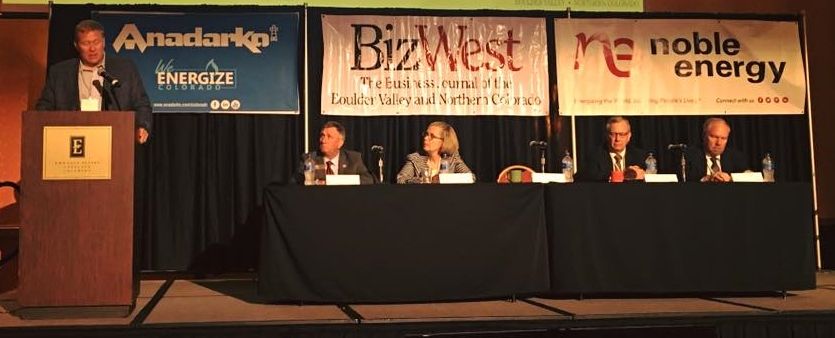Northern Colorado energy sector addresses earthquakes, accidents

LOVELAND — Regulators and energy-industry operators have implemented several measures to address recent oil-and-gas accidents in Northern Colorado, as well as human-caused earthquakes.
That was the message from various panelists at BizWest’s Energy Summit, July 20, at the Embassy Suites Hotel & Conference Center in Loveland.
William Yeck, a seismologist with the U.S. Geological Survey’s Geologic Hazards Science Center at the Colorado School of Mines in Golden, said that the National Earthquake Information Center operates 2,500 seismic monitoring stations worldwide and has developed extensive data on earthquakes caused by various aspects of energy operations.
SPONSORED CONTENT
Empowering communities
Rocky Mountain Health Plans (RMHP), part of the UnitedHealthcare family, has pledged its commitment to uplift these communities through substantial investments in organizations addressing the distinct needs of our communities.
Human-caused earthquakes can occur from creating stress in the subsurface through reservoir impoundment, drilling, geothermal operations, oil and gas production, hydraulic fracturing and wastewater injection.
Yeck said that there’s a clear correlation between increased seismic activity and oil and gas operations.
In Northern Colorado, a 3.4-magnitude earthquake that occurred near the Greeley-Weld County Airport in 2014 was “fairly small” but was centered around a water-injection operation.
“Earthquakes of this size are felt,” Yeck said. “They can surprise someone, but they generally don’t generate any damage.” He noted that someone feeling a quake of that magnitude might feel as if a truck hit their house, but the effects would be brief.
Mitigation measures can include a shutdown of an injection well or mandating a reduced rate of injection, plugging the bottom of the wheel, and avoiding injection near active faults altogether.
Northern Colorado’s recent energy-industry accidents have included an April 17 explosion in Firestone that killed two men, a May 25 oil-tank explosion near Mead that killed a Greeley man, and a June 27 oil leak of 5,040 gallons of oil near a well site in Erie.
The accidents have prompted regulators and energy companies to implement several safety measures, including inspection and capping of unused wells, shutting down of some older vertical wells, or changing setback requirements.
Stuart Ellsworth, petroleum engineer with the Colorado Oil & Gas Conservation Commission, the chief regulatory body for the industry in Colorado, noted that 38 rule changes have been implemented in Colorado over the past 20 years, with more being considered.
For energy companies, “It’s important to be transparent with regulators,” said Geraldine Brimmer, partner with Holland & Hart, a law firm. “If you do have an event, which is an explosion, it’s important to have people on site right away.
“You need to get on it and on it fast,” she said, “and show good faith and transparency with regulators.”
She said energy companies should:
- Employ a compliance officer or seek a qualified outside consultant.
- Follow regulations diligently, with thorough reports made.
- Use common sense. Don’t wait for inspectors to flag it and issue. Be proactive.
- Use updated technology: Know new technological options for detecting leaks.
- Be proactive about replacing and retesting aging pipelines.
- Be transparent with regulators.
Eric Jacobson, senior vice president with Extraction Oil and Gas, said it’s important to maintain state control of the energy sector, versus local municipalities and counties creating a patchwork of regulations.
“Having said that, we take extremely seriously and spend enormous amount of time interfacing with municipalities” on issues such as lights, traffic, noise, land use and other issues, he said.
“We think that it’s really critical to engage with local counties and municipalities,” he said.
Craig Walters, vice president of Rockies operations for Anadarko Petroleum Corp., speaking during a session on the future of the Wattenberg Field, said safety is of primary importance for the company.
“Safety has to be our first and foremost priority,” Walters said. “The tragic events that have happened recently here in Colorado truly are tragic, and we have to ensure that we’re looking out for health and safety first and foremost.”


